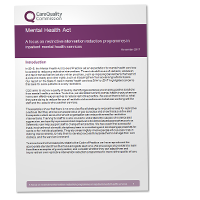This resource shares examples of good practice around reducing the use of restrictive practices.

In 2015, the Mental Health Act Code of Practice called on mental health services to reduce restrictive interventions. These practices include the use of restraint, seclusion and rapid tranquilisation. They also include wider practices: for example, preventing a patient from accessing outdoor space.
State of care in mental health services 2014-2017 found that there is variation in the way staff are using restrictive practices when responding to challenging behaviour. The report highlighted concerns that care for some patients is overly restrictive.
What we did
We identified 5 NHS mental health trusts where we've seen effective ways of reducing the use of restrictive practices. We asked the trusts about the work they were doing, and what was working well for their staff and the people who use their services.
What we found
The resource shares examples of good practice on the following topics:
- Improved leadership and governance (North West Boroughs Healthcare NHS Foundation Trust)
- A programme to reduce restrictive interventions (Mersey Care NHS Foundation Trust)
- Supporting positive behaviour (Tees, Esk and Wear NHS Foundation Trust)
- Providing person-centred care (Cambridgeshire and Peterborough NHS Foundation Trust)
- Embedding a positive and therapeutic culture (East London NHS Foundation Trust)